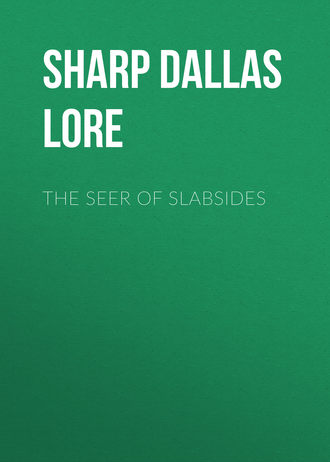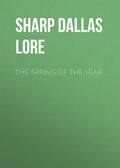
Sharp Dallas Lore
The Seer of Slabsides
It is not every farmer who should go to writing, nor every writer who should go to farming; but there is a mighty waste of academic literature, of premature, precocious, lily-handed literature, of chicken-licken literature, because the writers do not know a spade when they see one, would not call it a spade if they knew. Those writers need to do less writing and more farming, more real work with their soft hands in partnership with the elemental forces of nature, or in comradeship with average elemental men – the only species extant of the quality to make writing worth while.
John Burroughs had this labor, this partnership, this comradeship. His writing is seasoned and sane. It is ripe, and yet as fresh as green corn with the dew in the silk. You have eaten corn on the cob just from the stalk and steamed in its own husk? Green corn that is corn, that has all its milk and sugar and flavor, is corn on the cob, and in the husk – is cob and kernel and husk – not a stripped ear that is cooked into the kitchen air.
Literature is too often stripped of its human husk, and cut from its human cob: the man gone, the writer left; the substance gone, the style left – corn that tastes as much like corn as it tastes like puffed rice – which tastes like nothing at all. There is the sweetness of the husk, the flavor of the cob, the substance of the uncut corn to John Burroughs.
There is no lack of cob and husk to Thoreau – of shell and hull, one should say, for he is more like a green walnut than an ear of green corn. Thoreau is very human, a whole man; but he is almost as much a tree, and a mountain, and a pond, and a spell of weather, and a state of morals. He is the author of "Walden," and nobody else in the world is that; he is a lover of Nature, as ardent a lover as ever eloped with her; he is a lover of men, too, loving them with an intensity that hates them bag and baggage; he is poetical, prophetic, paradoxical, and utterly impossible.
But he knew it. Born in Concord, under the transcendental stars, at a time when Delphic sayings and philosophy, romance and poetry ran wild in the gardens where Bouncing-Bet and Wayward Charlie now run wild, Thoreau knew that he was touched, and that all his neighbors were touched, and sought asylum at Walden. But Walden was not distant enough. If John Burroughs in Roxbury, New York, found it necessary to take to the woods in order to escape from Emerson, then Thoreau should have gone to Chicago, or to Xamiltepec.
It is the strain, in Thoreau, that wearies us; his sweating among the stumps and woodchucks, for a bean crop netting him eight dollars, seventy-one and one half cents. But such beans! Beans with minds and souls! Yet, for baking, plain beans are better than these transcendental beans, because your transcendental beans are always baked without pork. A family man, however, cannot contemplate that piddling patch with any patience, even though he have a taste for literature as real as his taste for beans. It is better to watch John Burroughs pruning his grapevines for a crop to net him one thousand, three hundred and twenty-five dollars, and no cents, and no half-cents. Here were eighteen acres to be cultivated, whose fruit was to be picked, shipped, and sold in the New York markets at a profit – a profit plainly felt in John Burroughs's books.
Reading what I have just said, as it appeared in the "Atlantic" for November, 1910, Burroughs wrote in the course of a letter to me:
"I feel like scolding you a little for disparaging Thoreau for my benefit. Thoreau is nearer the stars than I am. I may be more human, but he is as certainly more divine. His moral and ethical value I think is much greater, and he has a heroic quality that I cannot approach."
Perhaps no truer word will ever be said of these two men than that; and certainly no more generous word was ever spoken by one great writer of another, his nearest rival. I have not, nor would I, disparage Thoreau for Burroughs's benefit. Thoreau dwells apart. He is long past all disparagement. "Walden Pond" and "The Week," if not the most challenging, most original books in American literature, are, with Whitman's "Leaves of Grass" and Emerson's "Essays," among those books.
Thoreau and Burroughs had almost nothing in common except their love of nature, and in that they were farther apart than in anything else, Thoreau searching by night and day in all wild places for his lost horse and hound while Burroughs quietly worshiped, as his rural divinity, the ruminating cow.
The most worthy qualities of good writing are those least noticeable – negative qualities of honesty, directness, sincerity, euphony; noticeable only by their absence. Yet in John Burroughs they amounted to a positive charm. Indeed, are not these same negative qualities the very substance of good style? Such style as is had by a pair of pruning-shears, as is embodied in the exquisite lines of a flying swallow – the style that is perfect, purposeful adaptability?
But there is more than efficiency to John Burroughs's style; there are strengths and graces existing in and for themselves. Here is a naturalist who has studied the art of writing. "What little merit my style has," he declares, "is the result of much study and discipline." And whose style, if it be style at all, is not the result of much study and discipline? Flourish, fine-writing, wordiness, obscurity, and cant are exorcised in no other way; and as for the "limpidness, sweetness, freshness," which John Burroughs says should characterize outdoor writing, and which do characterize his writing, how else than by study and discipline shall they be obtained?
Outdoor literature, no less than other types of literature, is both form and matter; the two are mutually dependent, inseparably one; but the writer is most faithful to the form when he is most careful of the matter. It makes a vast difference whether his interest is absorbed by what he has to say, or by the possible ways he may say it. If John Burroughs wrote in his shirt-sleeves, as a recent critic says he did, it was because he went about his writing as he went about his vineyarding – for grapes, for thoughts, and not to see how pretty he could make a paragraph look, or into what fantastic form he could train a vine. The vine is lovely in itself – if it bear fruit.
And so is language. Take John Burroughs's manner in any of its moods: its store of single, sufficient words, for instance, especially the homely, rugged words and idioms, and the flavor they give, is second to the work they do; or take his use of figures – when he speaks of De Quincey's "discursive, roundabout style, herding his thoughts as a collie dog herds sheep" – and unexpected, vivid, apt as they are, they are even more effective. One is often caught up by the poetry of these essays and borne aloft, but never on a gale of words; the lift and sweep are genuine emotion and thought.
As an essayist – as a nature-writer I ought to say – John Burroughs's literary care is perhaps nowhere so plainly seen as in the simple architecture of his essay plans, in their balance and finish, a quality that distinguishes him from others of the craft, and that neither gift nor chance could so invariably supply. The common fault of outdoor books is the catalogue – raw data, notes. There are paragraphs of notes in John Burroughs, volumes of them in Thoreau. The average nature-writer sees not too much of nature, but knows all too little of literary values; he sees everything, gets a meaning out of nothing; writes it all down; and gives us what he sees, which is precisely what everybody may see; whereas, we want also what he thinks and feels. Some of our present writers do nothing but feel and divine and fathom – the animal psychologists, whatever they are. The bulk of nature-writing, however, is journalistic, done on the spot, into a notebook, as were the journals of Thoreau – fragmentary, yet with Thoreau often exquisite fragments – bits of old stained glass, unleaded, and lacking unity and design.
No such fault can be found with John Burroughs. He went pencilless into the woods, and waited before writing until his return home, until time had elapsed for the multitudinous details of the trip to blur and blend, leaving only the dominant facts and impressions for his pen. Every part of his work is of selected stock, as free from knots and seams and sapwood as a piece of old-growth pine. There is plan, proportion, integrity to his essays – the naturalist living faithfully up to a sensitive literary conscience.
John Burroughs was a good but not a great naturalist, as Audubon and Gray were great naturalists. His claim (and Audubon's in part) upon us is literary. He was a watcher in the woods; he made a few pleasant excursions into the primeval wilderness, leaving his gun at home, and his camera, too, thank Heaven! He broke out no new trail, discovered no new animal, no new thing. But he saw all the old, uncommon things, saw them oftener, watched them longer, through more seasons, than any other writer of our out-of-doors; and though he discovered no new thing, yet he made discoveries, volumes of them – contributions largely to our stock of literature, and to our store of love for the earth, and to our joy in living upon it. He turned a little of the universe into literature; translated a portion of the earth into human language; restored to us our garden here eastward in Eden – apple-tree and all.







